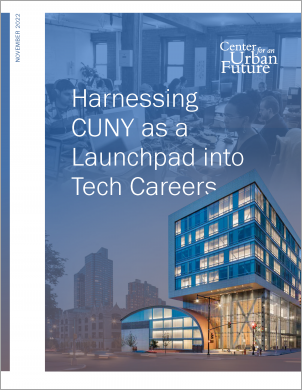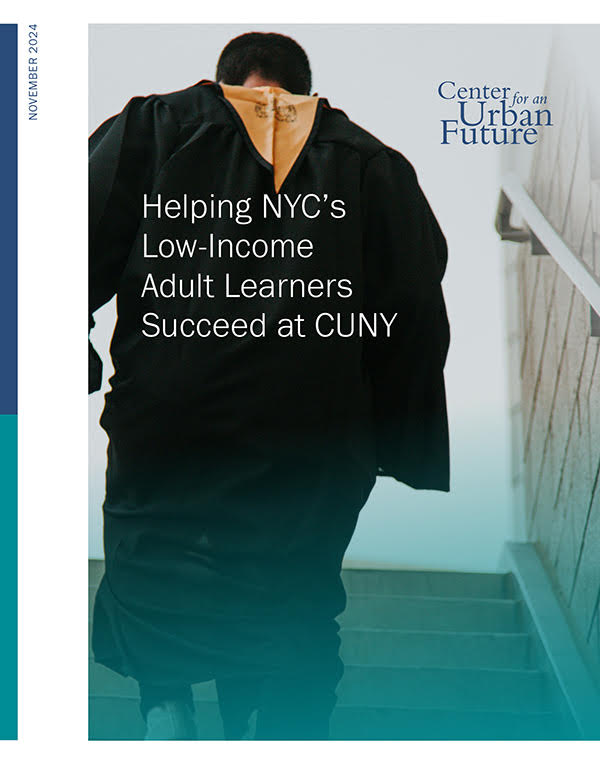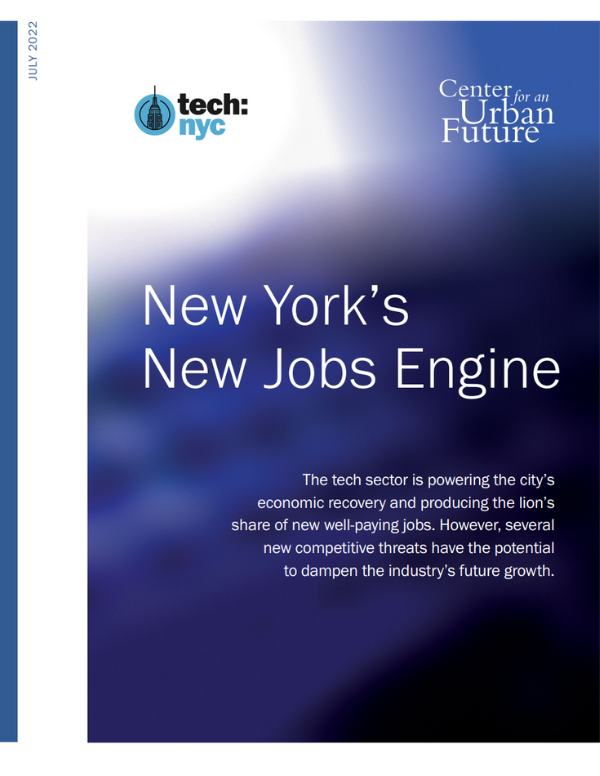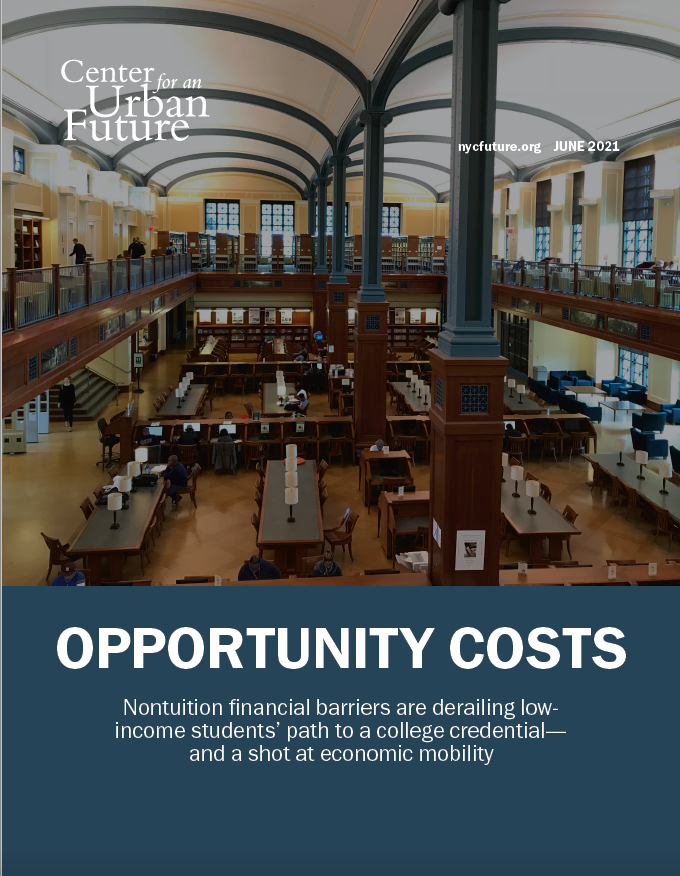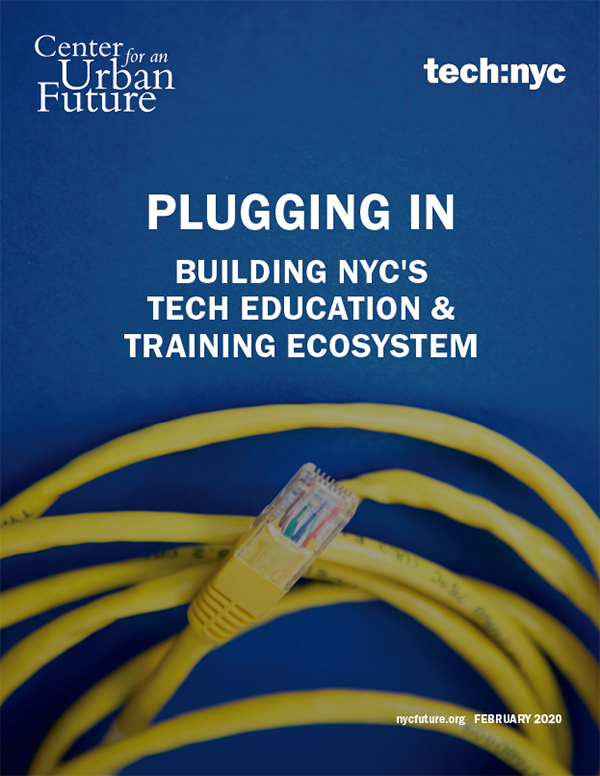Recommendations: How to Unlock CUNY's Full Potential and Build a More Inclusive Tech Sector
For New York City and State
Invest $20 million to scale up CUNY initiatives focused on expanding access to technology careers. New York City has supported several important programs in recent years that are succeeding in helping CUNY students pursue and succeed in technology careers, but these programs are only meeting a fraction of demand and lack funding commitments beyond 2022. Mayor Adams and the City Council should launch a new $20 million CUNY Tech Success initiative to sustain and scale these effective programs, including CUNY 2X Tech, CUNY Tech Prep, the Tech-in-Residence Corps, and the Tech Talent Pipeline Residency internship program. The most successful of these programs should be baselined in the city’s annual budget, with additional funding allocated to expand these initiatives to the colleges that lack them today, including City Tech and most of CUNY’s community colleges.
Support a major expansion of career services and employer relations staff at every CUNY college. There is a lot more that CUNY needs to do to strengthen career services and employer engagement across every college in the system, but CUNY cannot do this alone. City and state leaders should work together to boost funding for full-time CUNY staff and specifically support a major expansion of career services and employer relations professionals on campus. Currently, the average CUNY college makes do with a ratio of two to three career counselors for 10,000 students and few colleges employ any full-time staff focused on building and maintaining relationships with employers. CUNY should make strengthening these core functions a top priority and will need a new level of public investment to do so.
Partner with tech industry leaders to launch 2,500 paid tech industry internships by 2025. There are few changes that could have a more powerful effect on the career outcomes of CUNY technology graduates than a massive expansion of paid internships. Today, only 10 percent of CUNY students report participating in a paid internship at any point in their college careers. While competition with students from other universities and a lack of on-campus career counseling contribute to the challenge, our research shows that the supply of paid tech sector internships available in New York City is simply insufficient. Mayor Adams should work directly with industry leaders to secure commitments to launch 2,500 new paid tech industry internships by 2025, including spring and fall semester internships and microinternships, and partner with CUNY to ensure that as many students as possible are able to access these opportunities.
Commit to doubling the number of CUNY technology graduates from underrepresented backgrounds by 2027. New York City has made major strides in enabling CUNY to boost the number of students earning technology degrees each year. But to cultivate a more representative tech talent pool, much more needs to be done to help increase the number of women and Black and/or Hispanic students earning technology degrees and credentials at CUNY. City leaders should build on the highly successful CUNY 2X Tech initiative, which helped double the number of technology graduates at CUNY over the span of five years, and launch a new effort committed to doubling the number of tech graduates from underrepresented backgrounds by 2027. This effort should scale up powerful existing programs like Break Through Tech; expand support for peer and industry mentorship for women, girls, and students of color interested in computer science and technology; and invest in long-term commitments to equip every teacher with the skills needed to integrate computing education into every school and classroom across New York City’s public education system.
Allocate funding for CUNY to hire 250 new computer science and technology fulltime faculty over the next five years. Even as demand for computer science classes has skyrocketed in recent years, faculty hiring has struggled to keep pace. A hiring moratorium, growing reliance on adjuncts, and a wave of retirements have made matters worse, resulting in a university-wide decrease in full-time faculty of 5.5 percent over the past three years. To reverse these concerning trends and improve both the quality of computer science classes and the capacity of these programs, city and state leaders should work together to baseline funding for 250 new computer science and technology faculty over the next five years—approximately two new faculty hires per college per year.
Launch an advertising campaign that elevates the reputation of CUNY students, alumni, and tech programs. Even CUNY students with strong resumes and internship experience struggle with imposter syndrome and say that too few hiring managers and recruiters see CUNY as a reliable source of top-tier talent. New York City can do more to correct this misperception by rolling out an advertising campaign that elevates the success of CUNY students, alumni, and programs in tech fields. More than just marketing CUNY to prospective students, this campaign should focus on making the case for CUNY talent to prospective employers across New York City.
Boost the number of teachers equipped to integrate computing education across the K-12 system. CUF’s previous research finds that closing gaps in the availability of early childhood computing education could have the greatest impact on expanding access to technology degrees and careers over the long term—especially for women and Black and/or Hispanic students who are underrepresented at each step of the journey toward technology careers. This will require continued expansion of successful initiatives like Computer Science for All (CS4ALL) and the city’s P-TECH high schools, but it also requires the city to significantly expand computing education in grades K-5. By building excitement about technology pathways from the earliest years of a child’s life, New York City can encourage far more underrepresented students to pursue computing as they grow older.
For CUNY
Scale up career services and employer relations across every CUNY campus. One of the major factors limiting access to jobs and internships for CUNY students is a striking lack of career counseling and employer relations staff at CUNY’s 25 colleges. A ratio of 2 to 3 career services counselors per 10,000 students is the norm across most of the CUNY system and has changed little over the past decade. At the same time, few CUNY colleges have dedicated employer relations staff, limiting most to fielding incoming requests from employers rather than doing outreach and building relationships. To change this, CUNY should prioritize a major expansion and overhaul of career services and employer relations teams. Each college should hire additional career services staff, including employer relations specialists and full-time liaisons to the technology sector; create lookbooks of student resumes and GitHub profiles for employers; facilitate volunteer opportunities for tech workers and recruiters who want to meet with CUNY students; and connect with start-ups that may not be able to provide paid internships, but can offer mentorship, career exploration, and other opportunities. These efforts could create a consistent pipeline of CUNY students into technology jobs and internships, expand students’ networks and social capital, and build their confidence before graduation.
Make it far easier for employers to partner with CUNY and expand options for employer engagement. Nearly every employer interviewed for this report described the process of attempting to partner with CUNY as inefficient and cumbersome. More than just a link to an online job board employers are looking to build relationships with a single point of contact who can present them with a menu of options for partnering with and recruiting from CUNY. In addition to expanding the number of employer relations specialists on staff at each college, CUNY should launch a centralized point of entry for employers to engage with CUNY, staffed with relationship managers familiar with each of the city’s fastest-growing industries. CUNY should also develop additional services for employers and roll them out across every college, including social media takeovers, university-wide branding opportunities, industry meetups, on-campus coffee chats, sponsorship of career hubs and hackathons, and ongoing support from a dedicated relationship manager.
Launch a tech industry fellowship to embed current faculty in the tech sector for ongoing professional development and networking. As helpful as the Tech-in-Residence Corps has been for bringing industry professionals into the classroom, CUNY also needs to take new steps to ensure that current technology program faculty have opportunities to refresh their skills and build relationships with industry. Today, such options are severely limited, with some departments only able to offer $25 per year in conference support. To help address these issues, CUNY should launch a Tech Industry Fellowship for current faculty, embedding CUNY instructors in the tech sector for ongoing professional development and networking.
Incorporate nonprofit programs into the on-campus experience to expand opportunities for work-based learning and help students grow social capital. Work-based experience and networking are critical for gaining entry into technology careers. But CUNY students, who commute to class and often work while attending college, often struggle to build the professional and peer networks on their own that can lead to internships, fellowships, and job offers down the line. To overcome these barriers, CUNY should take new steps to partner with relevant nonprofit programs; bring them on-campus into careers services offices; ensure their programs and services are marketed widely to CUNY students; and make nonprofit training and coaching programs eligible for college credit wherever possible.
Continually update curricula to align with the needs of tech employers. While making permanent curriculum changes can be a drawn-out process, there are faster ways for CUNY to align learning objectives with the needs of technology sector employers. Even small shifts to existing courses for computer science and tech-related majors could have significant impacts, helping prepare students for the hiring process. For instance, technical interviewing should be woven into computer science programs, such as a mandatory one-credit seminar, building awareness of online resources like Leapcode. Partnerships with philanthropy and industry could also cover the cost of technical interview prep bootcamps for students.
Create new pathways for continuing education students into the technology sector. CUNY already has more than 100 technology-focused continuing education training programs for working and underemployed adults, representing vital onramps into well-paying jobs for New Yorkers without college degrees. But there’s more CUNY could do to integrate tech skills learning and work-based experience into continuing education programs. This should include partnering with industry leaders to expand the number of industry-recognized credentials offered through CUNY’s continuing education programs and ensuring that each one is eligible for college credit and can stack toward associate’s, bachelor’s, and even master’s degrees.
Develop a tech consultancy staffed by CUNY students to expand access to work-based experience. Many CUNY students who need the income from their retail or service jobs cannot afford to quit their jobs to do a semester-long or summer internship, even one that would improve their chances of being able to get a full-time technology job later on. CUNY should help ensure that more students are able to gain relevant work-based experience needed before they graduate by launching a tech consultancy—potentially focusing on relatively accessible and in-demand web/app and front-end development, cloud systems, and software quality assurance consulting—and targeting companies that typically outsource that work overseas.
For NYC's Tech Sector
Launch a major campaign to expand the number of paid internships offered in New York City, and prioritize CUNY students for these opportunities. Perhaps the single most powerful step that New York’s tech sector can take to expand access to careers for CUNY students is to ramp up the supply of paid internships in New York City and market them directly to CUNY students. Tech firms should work with Mayor Adams and CUNY leaders to launch a sector-wide internship campaign designed to bring online 2,500 new internships by 2025 and ensure that as many of these internships as possible are going to CUNY students. Tech firms can expand the supply of internships by launching microinternships to supplement more intensive programs, offering internships in the spring, fall, and winter as well as over the summer, and partnering with other companies to create CUNY-specific fellowships, following the model of investment firm Centerbridge and its CUNY Investment Industry Fellowship.
Expand recruitment efforts at CUNY. CUNY colleges host career fairs multiple times per year and offer employers other ways of getting in front of students, ranging from on-campus interviews to office visits to informal networking events. But to date very few tech companies have participated in these activities. Companies in New York City’s tech sector should commit to adding CUNY to the mix of colleges where they focus recruiting efforts and greatly expand their presence at career fairs and other hiring events. Recruiters hiring interns or seeking candidates for full-time entry-level roles should start their search at CUNY and hiring managers should encourage their HR partners to present CUNY candidates for consideration whenever new positions become available.
Partner with CUNY to create a flagship tech careers hub. New York’s tech sector should work with the city’s tech industry association and individual tech sector leaders to launch a Tech Careers Hub at CUNY. Modeled on a successful initiative underway in San Diego, the Tech Careers Hub would be both a physical center embedded in at least one CUNY college campus, as well as a virtual portal where tech employers, CUNY students, administrators, and faculty can meet to build relationships, exchange opportunities, and facilitate connections between CUNY and industry. The Tech Careers Hub should help expand opportunities for students to interact with industry professionals at in-person talks, off-campus site visits, networking events, pitch competitions, and mock technical interviews, as well as recruiting events, where tech employers share their industry knowledge and insights.
Partner with CUNY to launch a CUNY tech alumni network. For CUNY students and graduates trying to break into the technology sector, the lack of an alumni network represents a major barrier. Most private colleges invest in alumni relations efforts that help graduates and students build relationships, whether for mentorship, career advice, internship opportunities, or introductions to hiring managers at the companies where they work. But CUNY has very limited resources to stand up this network on its own. To help overcome this challenge, the city’s tech sector should collaborate with CUNY to launch a CUNY Tech Alumni Network comprised of current tech workers and industry leaders who are CUNY alums, and develop a continuous slate of programming designed to strengthen relationships among CUNY alumni in tech and introduce current students to CUNY alumni working across the industry.

